Diarrhea can be a symptom of many pigeon diseases, but when strange colors such as green start showing up in your birds’ droppings, there could be a reason for you to feel concerned.
Green pigeon poop can mean a lot of things. It might mean that your birds aren’t getting the right nutrition, but it could also be a sign that your pigeons are suffering from a condition.
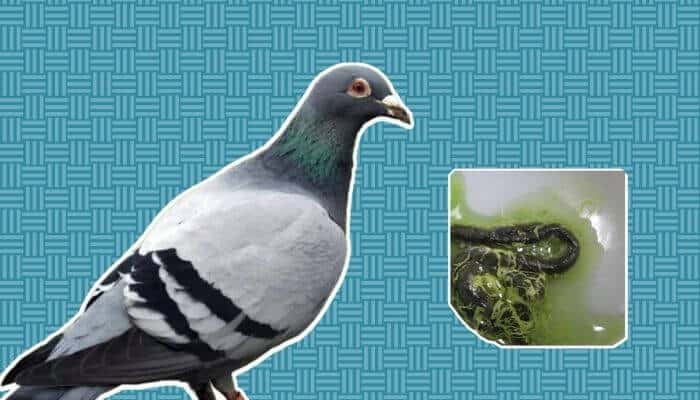
In today’s article, we’re looking at some of these causes, why green pigeon poop is dangerous, and whether or not it can be treated.
Possible Causes for Green Pigeon Poop
There’s no way of knowing the specific reason why this is a symptom that your birds are showing unless you consult an avian veterinarian or a person specialized in pigeon pathology.
Therefore, the best piece of advice that we have for you is to collect some of the feces and send it out to the lab or at least give your vet a call so that they can instruct you.

This article was written by our qualified veterinarian Cristina.
This is part of our commitment to providing you with the most trustworthy veterinary advice for your pigeons.
1. Chlamydiosis
Avian chlamydiosis is one of the most common diseases that can affect pigeons.
It is also quite common in other species, such as pet birds like budgies, cockatiels, or lorikeets.
While the infection itself isn’t dangerous to humans, it is quite risky for the entire pigeon population.
It can quickly be passed on from one bird to the next, and in no time, all of your pigeons might have developed worrying clinical signs or might become asymptomatic carriers that can infect other members of their flock.
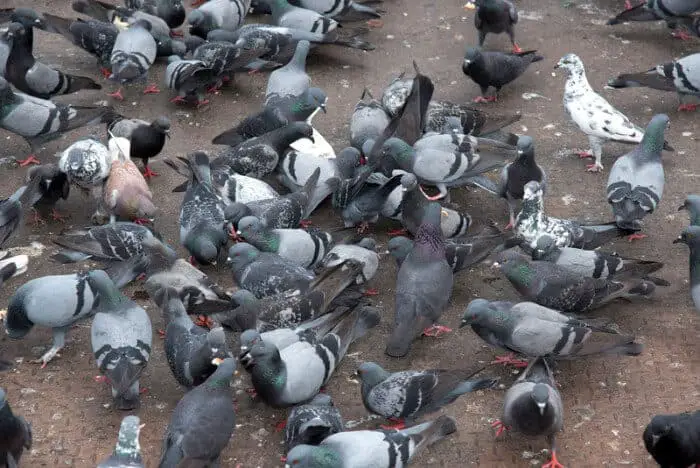
Since chlamydiosis is a bacterial disease, it can be treated with antibiotics.
However, the vet needs to perform a bacterial smear analysis and an antibiogram to find out just what medications your birds might respond to.
The reason green poop is a classic symptom of this condition is that the bacterium affects a variety of your pigeons’ internal organs, specifically the liver.
And if there’s one thing about the liver that can influence the color of your birds’ droppings, it is the bile bladder.
When the liver and bile bladder do not function properly, there could be a variety of color changes you might notice in your pigeons’ poop.
2. Colibacillosis
This is merely a fancy name for an Escherichia coli infection.
While E. coli infections don’t necessarily cause green poop, it can still be a sign of this disease if the birds’ liver or bile bladder suffers any amount of damage whatsoever.
Besides hepatic failure, this disease can cause severe dehydration, which is why death can occur in a record amount of time.
It is more commonly encountered in young pigeons, and that’s also the category where it can do the most damage.
Because young birds aren’t equipped with the same capable immune system compared to their adult counterparts, they risk losing their life much faster.
3. Paratyphoid
Paratyphoid, also known as salmonellosis, is another bacterial disease that can ravage pigeon populations.
The worst thing about the disease is that it can also lead to asymptomatic carriers.
Therefore, if your birds come in contact with such a pigeon carrier outdoors, they might catch paratyphoid and infect the rest of the flock.
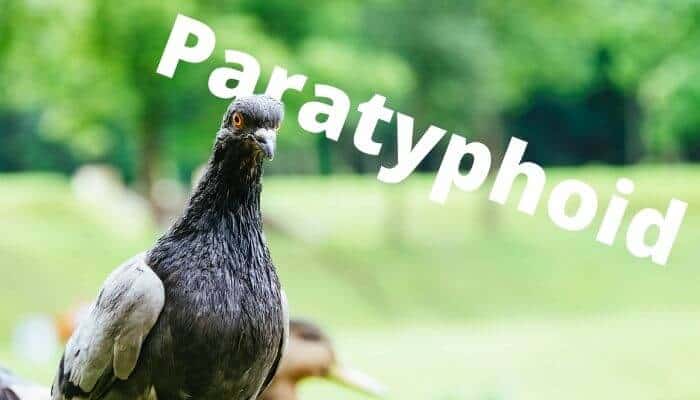
Diarrhea caused by this bacterial condition is also green.
The droppings are watery and happen time and again, leading to severe dehydration in most of the birds.
Besides this symptom, many of the pigeons will have ruffled feathers and exhibit a variety of clinical respiratory signs, mostly in the form of eye and nasal discharge.
Salmonellosis can only be treated with the right antibiotics, so it needs to first be diagnosed properly.
4. Coccidiosis
Coccidiosis is another common condition that can affect pigeons.
It is somewhat different compared to those that we have previously mentioned in that it is caused by a parasite, not a bacterium.
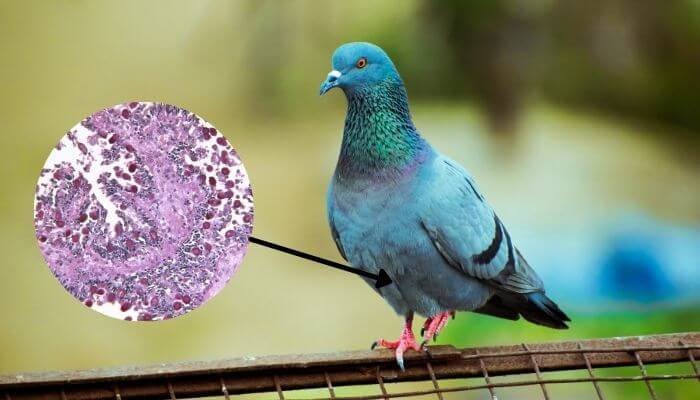
But the parasite isn’t even visible to the naked eye, which is why you might not suspect a parasitic disease when your birds start having watery and green droppings.
Along with the green feces, some of the pigeons might also show tremors, depression, a significant loss of appetite, skin discoloration, and overall lameness.
There are asymptomatic forms of coccidiosis, where some birds might not show any signs at all.
The diagnosis, in this case, is most likely to be completed post-mortem.
5. Adenovirus type I
This is a viral disease that can severely affect your pigeon’s health status.
Unfortunately, it almost always leads to hepatic necrosis, meaning significant liver damage, and this is actually the reason why most birds die.
There are two main types of Adenovirus that tend to affect this species.
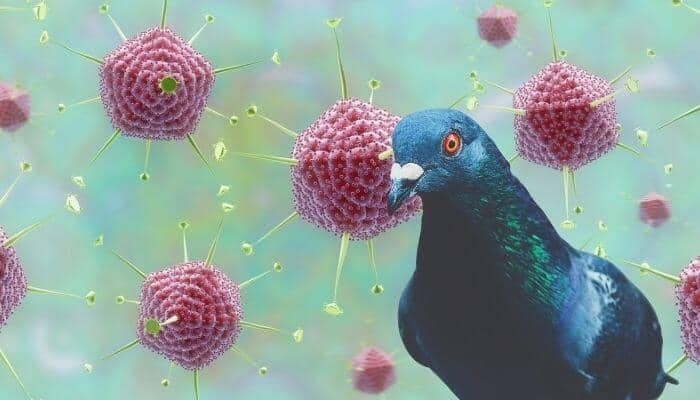
While type 2 can affect birds of all ages and can produce the same amount of liver damage, type 1 mostly affects pigeons that are younger than 1 year of age.
Along with green feces, some other symptoms that you might notice in your pigeon population if they have this condition are an increased appetite for water, weight loss, and discharge in the form of expelling the matter that they have eaten.
Vomiting is very uncommon in birds, so it should be a sign that convinces you to consult your avian veterinarian.
6. Liver diseases
Your birds can develop hepatic disease without necessarily coming in contact with a pathogen.
In fact, some foods can be contaminated with toxins, whether from fungi or other substances that the grains might have been treated with.
All of these ingredients can lead to your pigeons developing a liver condition.
In some cases, especially if their health isn’t really excellent, they might even develop liver failure and lose their life in a matter of several days.
In liver damage, most birds tend to have green droppings, but their urine might also become more ‘compact’ in the sense that you might actually notice calculi or solidified urate in the feces.
7. Poor nutrition and stress
While these two possible causes are perhaps less common, they can still be at the root of the green feces situation you are now facing.
Giving your pigeons the right type of nutrition and making sure that you add a vitamin complex to their drinking water can prevent a variety of health issues, including deficiencies and other diseases.
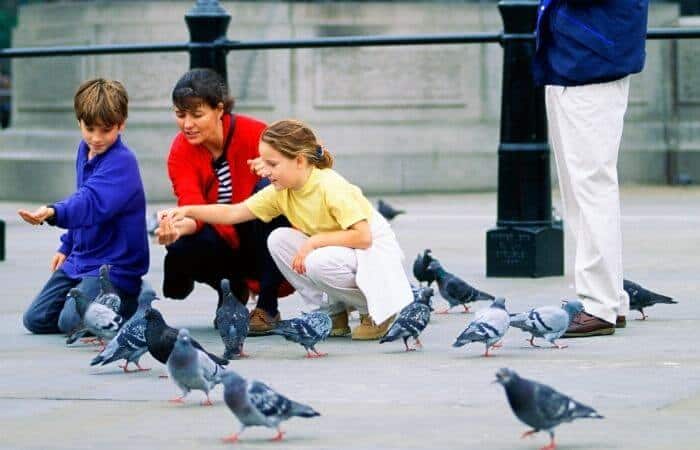
If you have recently made significant changes in your birds’ living space or you’ve moved them to a new home altogether, they could have watery, green droppings for several days without showing any other signs.
Making sure that you thoroughly clean their enclosure during that time can prevent them from suffering from a complicated condition.
Light green vs. dark green poop in pigeons
Bright green feces are usually a sign of intestinal parasites such as coccidiosis, mostly because they haven’t yet managed to inflict any damage on your birds’ liver.
Dark green poop can be a sign of stress or poor nutrition, but it could also be a symptom of a hepatic complication.
Should you be worried about your pigeon’s green poop?
Birds tend to have pretty water droppings in general, and that’s because they release a mix of urine and feces altogether.
However, strange colors such as green should always alarm you a bit and should convince you to call your avian vet.
The reason for this is that time is of the essence when it comes to diagnosing and treating any digestive condition of pigeons.
If they begin to have profuse diarrhea and they lose a lot of water from their bodies in that way, the condition could be fatal.
Diagnosing pigeon disease in itself can take at least a couple of days because the vet needs to know just what type of treatment they need to recommend.
So, whenever you see a worrying sign such as green poop, collect a sample and take it to the vet right away.
Treatment of Green Poop in Pigeons
First of all, there is no universal treatment that you can give to your birds and get them healthy.
Every therapy needs to be appropriate, meaning made specifically for whichever condition your pigeons are actually suffering from.
Viral diseases such as Adenovirus don’t really have any treatment.
All you can do in case your birds have it is to make their life quality as best as possible by cleaning their environment and separating the sick birds from the apparently healthy ones.
There are a variety of medications that can be used for coccidiosis, such as amprolium, folic acid antagonists, and others.
All of the bacterial diseases that we have mentioned in this article need to be specific as per the pathogen.

Some medications work for several different diseases at the same time, such as coccidiosis, salmonellosis, and E. coli.
Broad-spectrum antibiotics such as amoxicillin can be effective against both respiratory and digestive conditions, so they tend to work against both paratyphoid and E. coli.
Your veterinarian will select the right treatment for your birds. Do not give pigeons medications in the absence of a vet’s guidance.
Drugs can have heaps of side effects, and many can cause liver damage, especially when given in large doses.
Not only will you not be treating the actual disease, but you could risk making your birds even sicker if you use a medication without it having been recommended by a vet.
Sources:
- Diseases That Affect Race Performance of Homing Pigeons. Part II: Bacterial, Fungal, and Parasitic Diseases, David J. Rupiper, DVM, Journal of Avian Medicine and Surgery, 1998
- Relevance and treatment of coccidiosis in domestic pigeons (Columba livia forma domestica) with particular emphasis on toltrazuril, Maria-Elisabeth Krautwald-Junghanns et al, J. Avian Med. Surg., 2009
- Multidrug-resistant Escherichia coli and Salmonella spp. isolated from pigeons, Shah Jungy Ibna Karim et al, Vet World, 2020
